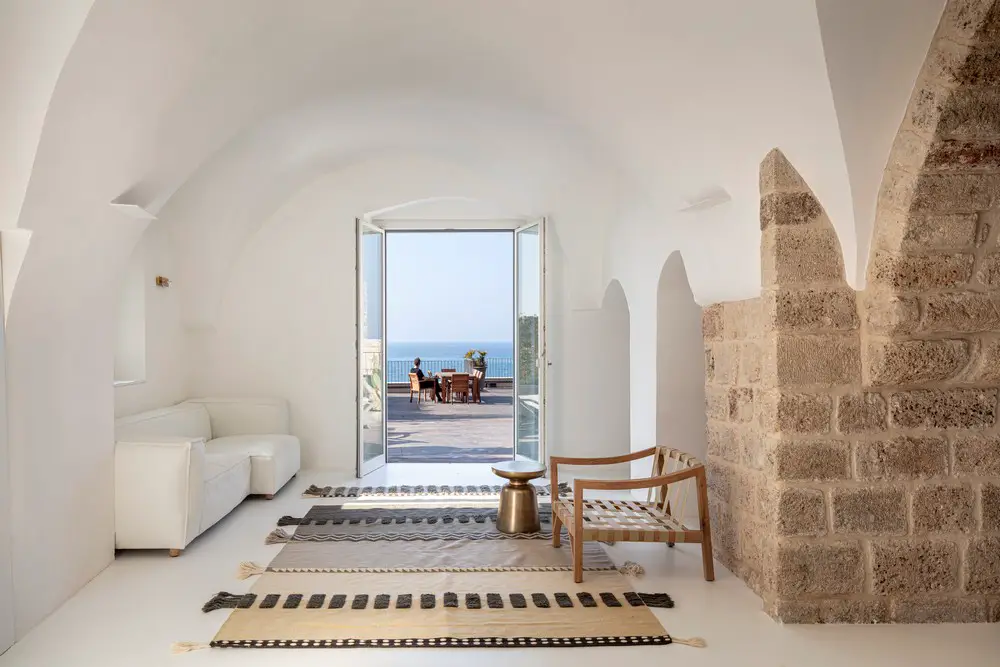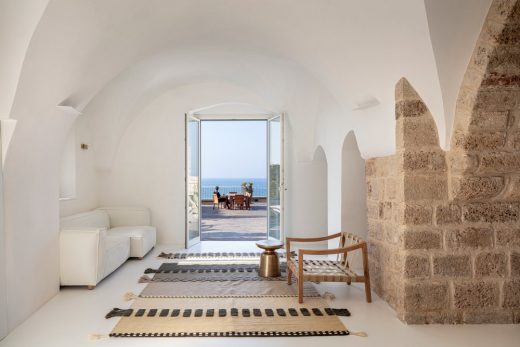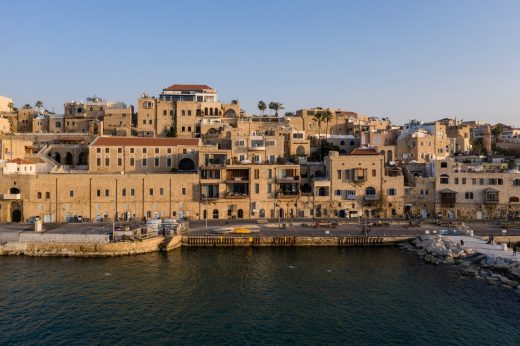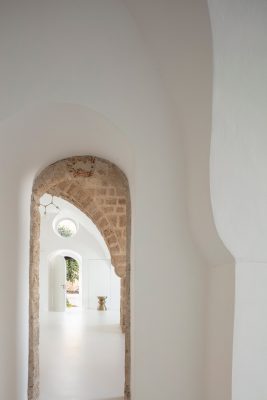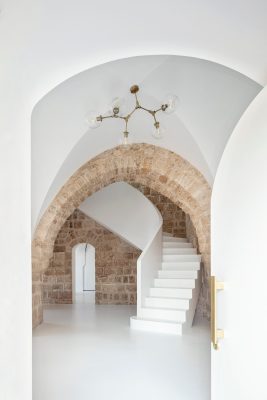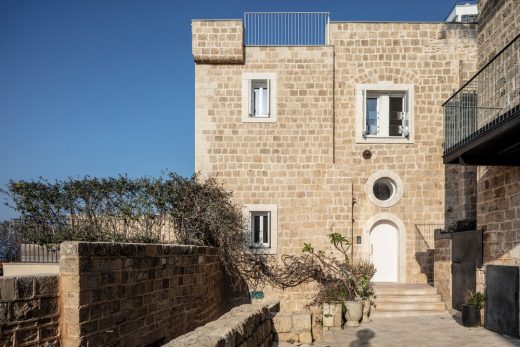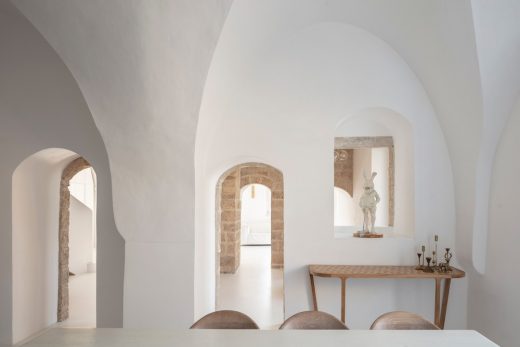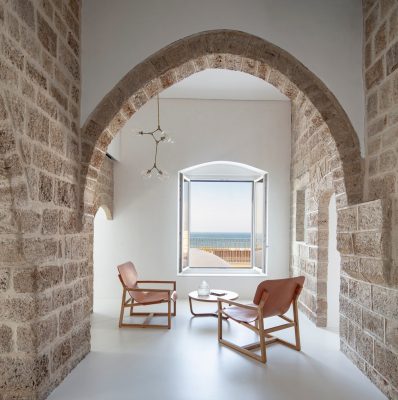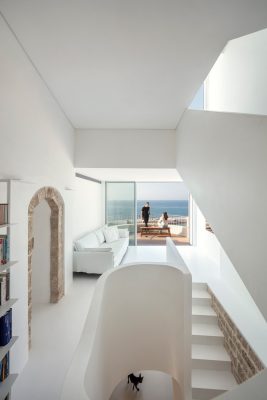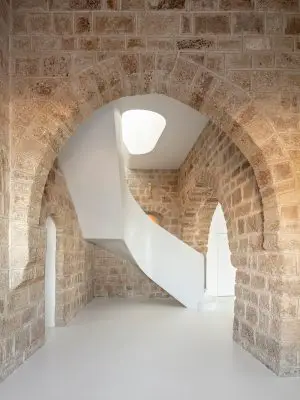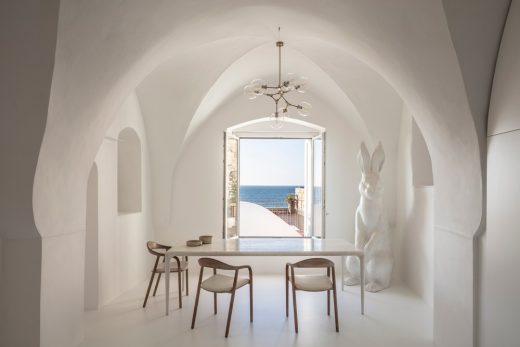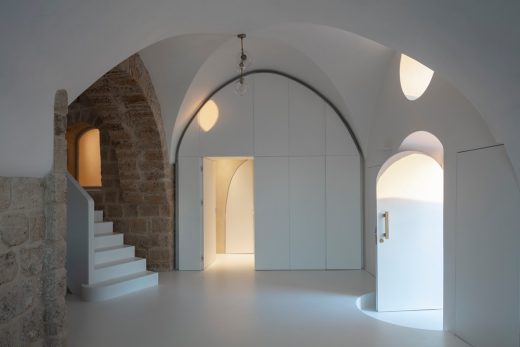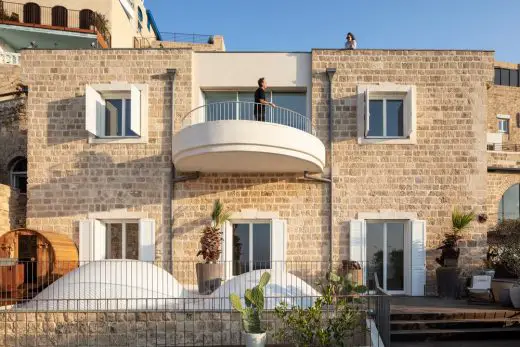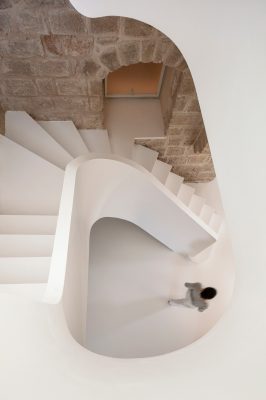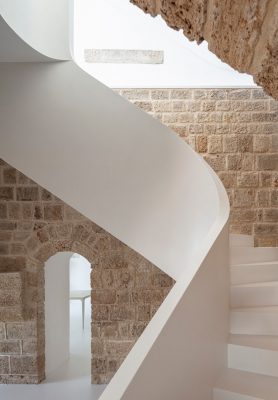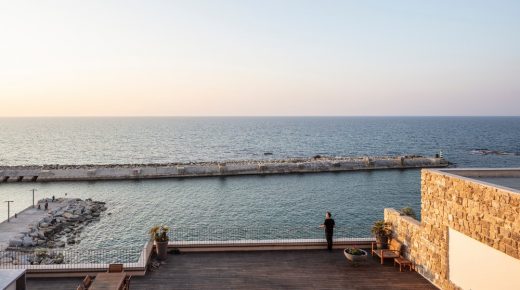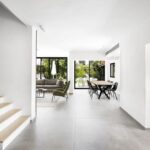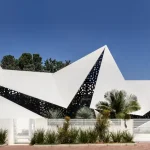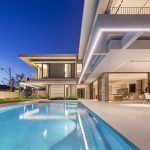Tel Aviv Real Estate Project, Modern Israeli Renovation Architecture, Old Jaffa Home Images
Jaffa House in Tel Aviv
22 Jun 2021
Jaffa House
Architects: Raz Melamed and Omer Danan
Location: Old Jaffa, Tel Aviv, Israel
Facing the endless waves of the sea that break right at the entrance Old City, townhouses stand with an impressive and traditional stone cladding. Within one of these ancient buildings lies an apartment that architects Raz Melamed and Omar Danan turned into a house that is a meticulous, one-of-a-kind architecture.
Jaffa House was designed for a young couple and their two children, who have already lived in the home for many years and knew how to identify every corner inside while identifying the home’s every need for improvement. In addition, they got to know the neighborhood around them in depth, including the climate and community that surrounds them– a very important detail in planning a home in a familiar environment.
The buildings that surround the house are built in the topography of a ridge, which has seen architectural changes over the past 300 years, throughout which the houses were split and united frequently according to the wishes of the residents. This joint-architect project provides a rare appearance as it is uniquely built in a clear grid whose ground floor is divided into 6 orthogonal units using columns and domes, with no levels or changes in ceiling heights.
The facades of the other houses in the neighborhood feature a traditional construction that incorporates magnificent antique walls, arches and domes, which are in a uniform and rigid frame, inflexible to architectural changes, which is why in the original appeal the tenants sought an interior-only renovation so as not to disturb the traditional exterior.
Nonetheless, reality has a way of surprising us all, and after looking at the property and the possibilities that lay within, the architects proposed a number of alternatives for design. This move was received with open arms by the highly aesthetic customers who take care to maintain the home’s look even in everyday use, whether it is a white sofa or light carpentry.
The main challenge of the architects in the beginning was the ban on changing the facade of the building. Added to this was the fact that the tenants really liked their house and any change had to be justified on a practical as well as a design level.
And so it was!
The architects discovered new spaces for the customers within the familiar space that could be used by them on a daily basis, and offered them a new layout for maximum utilization of the space whether for hidden storage or for visible use.
The interior of the house in its redesign presented a play between traditional and new, smooth and rough, plaster and stone – in the original construction the house was covered entirely with Kurkar stone, an ancient traditional stone in Israel, that adorned its walls and arches, and during the renovation was plastered in selected parts whose role was doubled, playing both contemporary and clean.
The white plaster mimics the feeling of the sea, which in its infinite appearance creates a feeling of pure serenity. In this way the architecture is a continuation of the sea, and vice versa, and they live in subordination as if they were a whole in which there is no partition between a built element and a natural element.
There is no doubt that the sea is an integral part of the design of the house, and being a cosmic motif, infinite like space or desert, it illustrates the natural flow of the landscape, and so the apartment in design is its architectural reflection: its walls are the architectural cosmic motif, their white color begins at one point and winds uninterrupted around the house in an endless performance in space.
The entrance to the house is greeted by a door with a white arch and a brass handle, a material reminiscent of stone, which will return as a jewel throughout the house with light fixtures, a library, taps and handles. When opening the door, you are welcomed by a white resin-paved space, a material without partitions that creates an unstoppable flow in the space.
The first motif to be discovered is the stairwell, completely open on the floor sequence, a rare architectural element in houses of this type. The result is a long vertical space that emphasizes the height of the house, the materiality of the plaster, and the cleanliness of the architecture.
The stairs and railing are painted white, emphasizing that there is no separation between the floor and the walls, and the two planes flow into each other for perfect continuity. The white color is also found in design elements such as blinds, carpentry, furniture, sinks, Corian countertops, and art sculptures by homeowners. Added to this are appearances of natural wood, which create a fruitful dialogue with the stone – two materials with character that bring warmth to the space.
The house has two floors with a living room, a living area, a kitchen, a dining area, a guest toilet, and a huge balcony on one level with a thin covering, overlooking the sea and equipped with a sauna, jacuzzi, shower, living room and kitchen. The balcony is a major player in the design of the house as most of the life takes place in it, whether for entertaining or for the enjoyment of the tenants themselves.
A view from the balcony to the western wall reveals an ancient stone façade with new brick windows, and a semi-circular balcony, also white, so that the new white stands out against the ancient stone, and together they tell a story on historical and contemporary levels.
The private space is on the second floor hosts the family corner and the TV, with the bedrooms of the parents and children on both sides. The master suite overlooks the sea through the white wooden shutters, and the view truly competes with the best possible picture that could have been hung on the wall. The bed is recessed in carpentry that serves as the back of a bed and a base for the reading lamps.
All the walls of the room are covered with white cabinets, and the door of the one overlooking the sea leads to the bathroom. A spacious shower with a Corian planter for shampoo puts in the bath, where the arches serve as a luxurious soap tray. The room is adorned with brass light fixtures and faucets, and a rainbow-shaped mirror that looks like it came out of an Arabian Nights legend. The bathroom cabinet is built from a wooden facade reminiscent of stone shades, covered with a white Corian surface and together with the smooth tadelakt cladding, maintains a clean, practical look.
The children’s rooms are located across the hall, and are characterized by a minimalist design, white carpentry, and natural stone that connects them to the whole house.
All over the house for architects it was important to preserve the high ceilings, a planning challenge that was solved thanks to creative thought, and hiding the technical systems behind carpentry. Thus, for example, it can be seen that there are no air conditioning units in the kitchen, and the operation of the air-conditioning system is made possible thanks to disconnections in the form of arches designed in carpentry. This design solution meets a practical need, along with maintaining the design language of the house that emphasizes a clean and continuous line. The effect of height is also seen in lighting that does not use recessed fixtures, and the lighting of the space is done with the help of wall fixtures alongside decorative lighting hanging from the ceiling.
The project reflects the architectural concept of Melamed and Danan, which emphasizes clean lines and ignores ornate decoration. In addition, the color is influenced by the use of natural materials such as wood and stone, which stand out against the background of the nature that surrounds the house, is the sea. The materials and colors of the house are bounded by a frame with 4 vertices: the blue that looks out from the sea, the white that appears in the architecture and furniture, the stone that emphasizes the arches of the building, and the brass that appears in perfect solemnity.
The meticulous planning, the design to the last detail, the precise combination of materials and colors – all of these are the result of excellent teamwork between the two architects, who each have their own free and creative thinking. In the case of Melamed and Danan it is a matter of full cooperation, a synergy in which one completes the other’s sentence, and knows what the other is thinking even before he has said it. The two added to the team a project manager who specializes in conservation, who met the wishes of the architects and the new design in the face of complex conservation techniques. The result of the precision in details created a harmonious celebration of natural color and material that create a modern home with a warm feeling.
Photography: Amit Geron Photographer
Jaffa House, Tel Aviv images / information received received 220621
Location: Jaffa, Tel Aviv, Israel, Middle East
Israel Architecture Designs
Contemporary Israel Architectural Selection
Tel Aviv Architecture Tours by e-architect
Tel Aviv Residences
Contemporary Residential Properties in Tel-Aviv
SSY House, Tel-Aviv
Design: Broides Architects
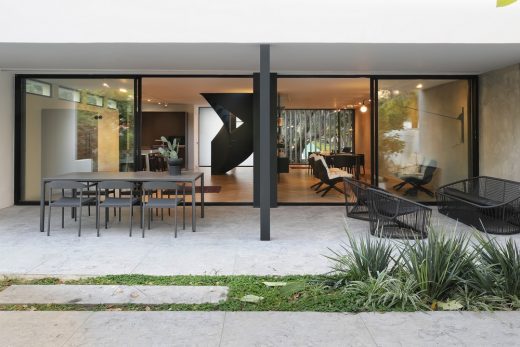
photo : Jonathan Ben Chaim
New Tel-Aviv Villa
The Black Core House, Tel Aviv
Design: Axelrod Architects
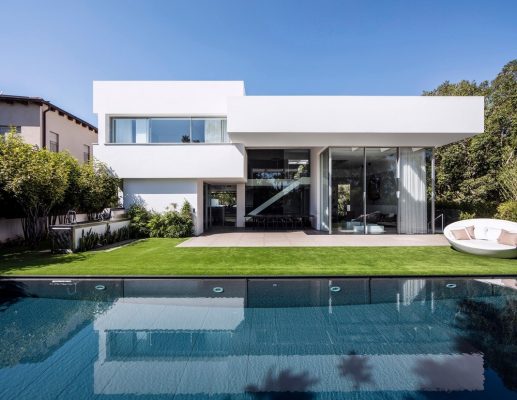
photograph : Amit Geron
The Black Core House Tel Aviv
Comments / photos for the Jaffa House in Tel Aviv design by Architects Raz Melamed and Omer Danan page welcome

